Graham Reid | | 3 min read
13th Floor Elevators: Postures (from Easter Everywhere)
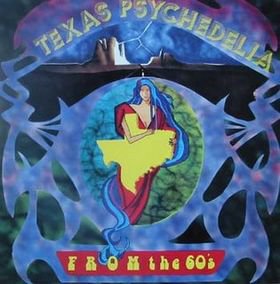
The description “psychedelic music”
– much like “freedom” – can mean whatever you want. The first
albums with “psychedelic” in the title were by 13th
Floor Elevators out of Texas (The Psychedelic Sounds of the
13th Floor Elevators) and
New York's Blues Magoos (Psychedelic Lollipop), both
released in 1966.
Psychedelic Lollipop – recently reissued, and on limited edition vinyl too – isn't quite the
spaced-out sweet thing the title suggested: the garageband Blue
Magoos covered James Brown's I'll Go Crazy which had been in
their live act, and dropped in some pretty ballads alongside
Byrds-like jangle pop-rock. Terrific, but not exactly head music –
although their Tobacco Road heads into space in a terrific
guitar solo.
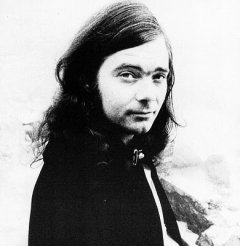 Austin's 13th
Floor Elevators were the real thing. Helmed by singer/writer Roky
Erickson (left) and songwriter Tommy Hall (who played electric jug), their
Psychedelic Sounds debut
and follow-up Easter Everywhere are considered psyched-out
classics.
Austin's 13th
Floor Elevators were the real thing. Helmed by singer/writer Roky
Erickson (left) and songwriter Tommy Hall (who played electric jug), their
Psychedelic Sounds debut
and follow-up Easter Everywhere are considered psyched-out
classics.
The Elevators are getting excellent
reissues by Charly: Psychedelic, Easter
and their final album Bull of the Woods (cobbled together from
various sessions) come as double discs with excellent essays, period
photos and artwork; and there's also the 7th
Heaven; Music of the Spheres collection of singles, B-sides and
so on.
The Elevators – as with Blues Magoos – had a rock'n'roll heart, but had inhaled and gobbled more than those New Yorkers.
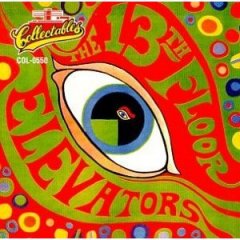 On their debut – the reissue with mono and
stereo mix versions – they open with their two-and-a-half minute
garageband classic You're Gonna Miss Me, but follow it with
the five minute astral flight Roller Coaster where Stacy
Sutherland's guitar pointed to their true direction, which was
“further out”.
On their debut – the reissue with mono and
stereo mix versions – they open with their two-and-a-half minute
garageband classic You're Gonna Miss Me, but follow it with
the five minute astral flight Roller Coaster where Stacy
Sutherland's guitar pointed to their true direction, which was
“further out”.
Tracks like Reverberation and Fire Engine were located between the garage and the tinny house, but they also offered a neat line in dreamy pop (Splash 1, the Dylanesque Kingdom of Heaven).
Easter Everywhere of '67 – made after regularly ingesting LSD, then not illegal, and internal arguments – is rocking and trippy in equal measure, Hall falling into mystical Eastern religions and philosophies for the eight-minute opener Slip Inside This House, and the six minute Postures (Leave Your Body Behind).
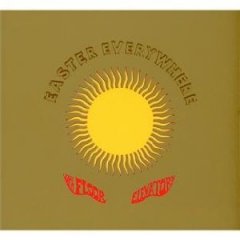 Again
the reissue comes with mono and stereo remixes, but in either
Sutherland's fluid space-guitar, Erickson's impassioned vocals and
that weird sound of jug grab attention. There's also an aching
version of Dylan's It's All Over Now Baby Blue.
Again
the reissue comes with mono and stereo remixes, but in either
Sutherland's fluid space-guitar, Erickson's impassioned vocals and
that weird sound of jug grab attention. There's also an aching
version of Dylan's It's All Over Now Baby Blue.
The band were kneecapped by problems
however – drugs, line-up changes, arguments between Sutherland and
Hall about Hall's mish-mash of religious images in his lyrics and
ideas for cover art, encounters with cops . . . then Erickson being
busted again, pleading insanity to get a lesser sentence and ending
up in a mental institution for more than two years where he was given
Thorazine and shock therapy.
Their was an astonishingly complex,
wayward story acted out in fewer than three years.
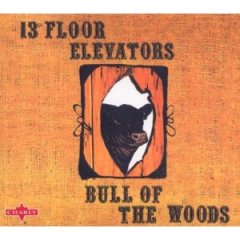 Bull of the Woods – Roky
mostly absent due to drugs/hospitalisation, Hall having quit – is
often overlooked but contains more garageband tripiness, stoned
country (Down by the River) and generally weird pop. The
reissue includes five live and slightly odd tracks. Not their finest
hour, but usefully mad.
Bull of the Woods – Roky
mostly absent due to drugs/hospitalisation, Hall having quit – is
often overlooked but contains more garageband tripiness, stoned
country (Down by the River) and generally weird pop. The
reissue includes five live and slightly odd tracks. Not their finest
hour, but usefully mad.
And that was it for 13th
Floor Elevators. But there was a welcome coda.
Erickson – with Okkervil River – delivered one of 2010's best albums with True Love Cast Out All Evil, some songs from his hospitalisation period.
It was an
album of cracked grace and sounded like a redemption.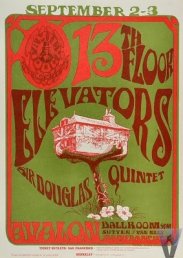
So
that's the strange and sad tale of 13th
Floor Elevators and their mostly impressive, always interesting and
sometimes crazy catalogue.
Feel free to use “psychedelic music” quite freely about it. People did back then – and it was music about freedom anyway.
Like to hear more along these lines?
Or just be courageous and go straight to "psychedelic".


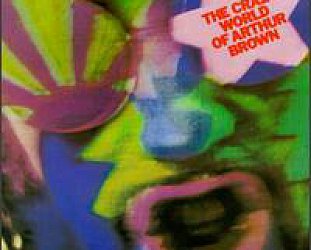
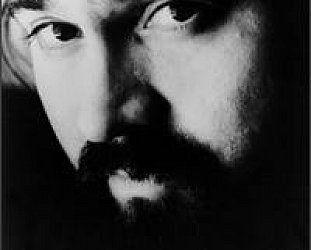
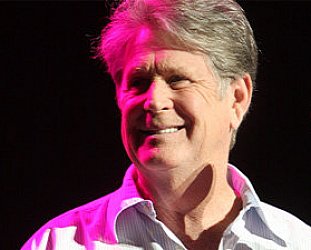
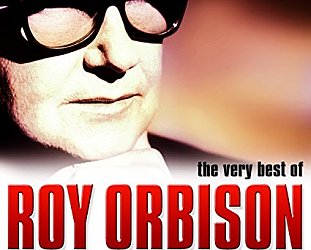
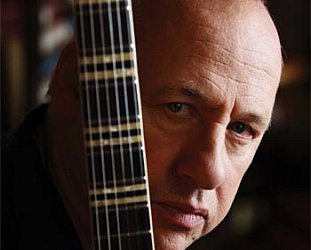
Andrew Schmidt - Mar 23, 2011
Easter Everywhere remains one of the few albums I have never stopped listening to. The CD is still a constant companion. It was surprisingly easy to find in NZ in the 1980s. Paul Drummond's recent exhaustive (but not exhausting) history of the group fills out what is a complex story. Sometimes uplipting and often tragic, it charts a little known course through the tropes of the era. Much like Nicholas Schou's Oranage Sunshine it exposes the San Francisco based version of the acid sixties as a
Savereduction of a much wider experience with multiple bases.
post a comment